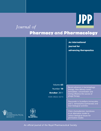Azithromycin suppresses proliferation, interleukin production and mitogen-activated protein kinases in human peripheral-blood mononuclear cells stimulated with bacterial superantigen
Abstract
Objectives Macrolide antibiotics are used for the treatment of immunological disorders such as psoriasis. However, few studies have investigated the immunoregulatory efficacy of macrolides in bacterial superantigen-stimulated immune cells.
Methods The suppressive efficacies of azithromycin, clarithromycin, roxithromycin and prednisolone were evaluated in vitro against the concanavalin A- or toxic shock syndrome toxin 1 (TSST-1)-induced proliferation of peripheral-blood mononuclear cells (PBMCs) obtained from nine healthy subjects. The concentrations of six cytokines in a PBMC-culture medium were measured using bead-array procedures followed by flow cytometry. Cellular c-jun N-terminal kinase (JNK) and extracellular signal-regulated kinase (ERK) activity were measured using cell-based ELISA procedures.
Key findings Azithromycin, clarithromycin and roxithromycin inhibited the proliferation of both the concanavalin A- and superantigen-stimulated PBMCs dose-dependently. The effect of azithromycin was the strongest, with IC50 values of less than 5 µg/ml. Furthermore, the suppressive efficacy of prednisolone against concanavalin A- or TSST-1-stimulated PBMCs was significantly promoted in combination with 5 µg/ml azithromycin (P < 0.002). The concentrations of TNF-α, interleukin (IL)-2, −4, −5 and −10 in the supernatant of concanavalin A- or TSST-1-stimulated PBMCs cultured for 72 h decreased by 65–98% in the presence of 5 µg/ml azithromycin. The stimulation of PBMCs with concanavalin A or TSST-1 increased cellular JNK and ERK activity, and 5 µg/ml azithromycin significantly attenuated the increased activity of JNK in the TSST-1-stimulated cells and ERK in the concanavalin A- and TSST-1-stimulated PBMCs, respectively (P < 0.05).
Conclusions Azithromycin suppresses mitogen- or superantigen-induced proliferation of PBMCs by possibly inhibiting both cellular JNK and ERK activity.




